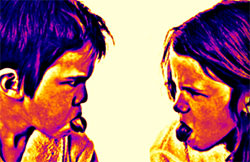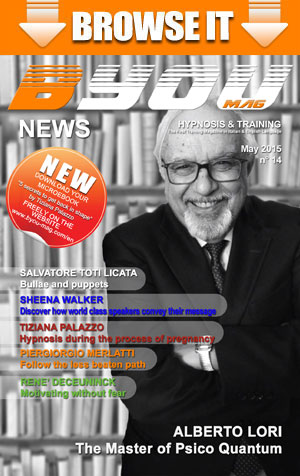Are we social animals? by Tiziana Palazzo
09 May, 2014
 Are we social animals?
Are we social animals?
Yes we are …
Our animal existence is firmly linked to the ability to understand what others are doing, understanding the intentions and interpreting their feelings. According to a more traditional point of view, when we observe a person to act, our nervous system perceives through sight and other sensory modalities, a series of information that a complex cognitive apparatus processes and compares them to the before lived experiences so similar . Different is, instead, the theory according to whom the mechanism that allows us to understand the actions of others, is radically different from those used to explain the physical processes.
According to this point of view, we understand others because we put ourselves in their shoes , we simulate what we would do in the same situation, we imagining it. In comparison, the two understanding systems have this difference: the first follows the typical attitude of the police officer, while the second shows an acquisition of understanding of the facts of the situation and of emotions through the personal involvement although imaginative ( theory by Maurice Merleau-Ponty). But finally, a neurophysiologic key discovery, took place in the nineties.
This discovery by Giacomo Rizzolatti and other international scientists, has revealed the existence of a mechanism of mutual understanding, genetically built to the man, thanks to which the actions performed by others, captured by the sensor systems, are automatically transferred to the motor system of the observer.
This allows to him to have a copy of the motor behavior observed , as if himself was who run it. The neurons that perform this transformation of the action from one format to one sensory motor were called mirror neurons. And it is thanks to this discovery that a new conception of the motor system has become possible, this allows the entry of neurophysiologic investigation of fields that were exclusively monopolized by some humanities. In short , they are also studying new approaches to deal with the dynamics of autism.
How born a Discovery?
The answers are many, some say for inspiration, for those who electrocution
and by inference .
In an interview , the scientist Giacomo Rizzolati said that he just came to this extraordinary discovery , starting from a totally different point from which “all” usually departed. So were therefore made the greatest archaeological discoveries, including the “Higgs’s Boson”. So perhaps is not it confirmed that looking at things from another perspective we reveal these extraordinary details that we can miraculously change the quality of our lives?
Rome, March 27, 2014 – The Italian scientist Giacomo Rizzolatti won , for his pioneering research on higher functions of the brain, The Brain Prize 2014.
Tiziana Palazzo
www.tizianapalazzo.it
Related Posts
-

SAGEisPOWER® ANIMA by Tiziana Palazzo
-

Goodby Ciro... by Tiziana Palazzo
-

Be Water, my Friend! by Tiziana Palazzo
-

Around The Editor by Tiziana Palazzo
-

The interview with Valentina Iannazzone by Tiziana Palazzo
-

Stress and the Holidays By Tiziana Palazzo
-

The Emotional Intelligence Goes On Holiday by Silvia Minguzzi
-

Let’s adopt sustainability value by Tiziana Palazzo
-

The Archaic Chain: hypnosis is a intimate relationship by Marco Pacori
-

Mental Sport Coaching by Salvatore Toti Licata



